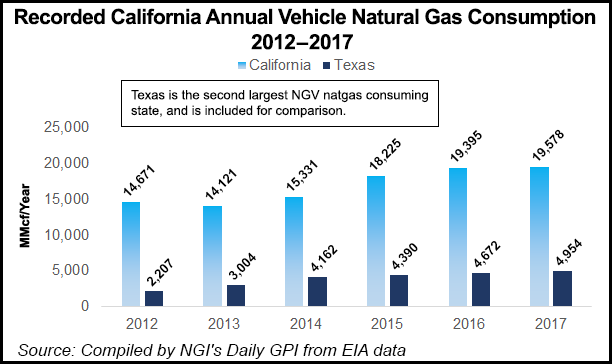Infrastructure | NGI All News Access | NGI The Weekly Gas Market Report
SoCalGas Revs Up Near-Zero Emission Natural Gas Engines
Fleet operators in California got a boost from Southern California Gas Co. (SoCalGas) to pursue part of a $21 million funding pool to put more near-zero emission natural gas vehicles (NGV) on road in the heavy duty truck sector.

Nearly 400 fleet operators applying for grants had the process streamlined by the Los Angeles-based Sempra Energy gas utility for funds doled out by the South Coast Air Quality Management District (SCAQMD). SoCalGas has a goal to replace at least 400 diesel trucks with NGV trucks through grants for up to $100,000/vehicle.
The SoCalGas transportation team has been working closely with fleet operators in the utility service territory, said the utility’s Yuri Freedman, senior director of business development. “These natural gas trucks are available today and will immediately contribute to achieving the South Coast Basin’s air quality goals,” he said.
SCAQMD Executive Officer Wayne Nastri said the utility’s efforts can “help reduce harmful diesel emissions to help clean the air in the Southland. Through technology advancement programs, industry partnerships and incentive programs we will continue to make substantial progress to reduce air pollution.”
SoCalGas officials said a regional incentive program offered by the SCAQMD is open until June 5 for grant applications in Los Angeles, Orange and Riverside counties.
“Additionally, the San Joaquin Valley Air Pollution Control District recently established new grant incentives for an ongoing truck voucher program that would replace existing heavy duty trucks with the cleanest ultra-low NOx 12-liter vehicles available,” a utility spokesperson said.
California also leads the nation in adopting zero-emission technologies in transportation through combinations of renewable natural gas (RNG) with plug-in hybrid electric vehicles (PHEV), among others.
The California Energy Commission’s (CEC) program was recently completed by Efficient Drivetrains Inc. (EDI), whose technology in turn was adopted for a fleet of six plug-in hybrid EVs using RNG fuel that registered a 99.9% reduction in vehicle emissions.
The fleet at Sectran Security operates six PHEV armored vehicles. Collaborating with the CEC, Sectran is one of the firms leading the accelerated push in the state toward creating a zero-emission transportation environment. CEC said the EDI PowerDrive 6000 has been durability tested for 3.8 million miles in bus fleets and by major North American original equipment manufacturers.
Another compressed natural gas (CNG) advance for Class 6-8 trucks emerged early in March by Texas-based Momentum Fuel Technologies, whose GreenLync 2.0 electronic communications system gauges distance to empty when running on natural gas.
And in Pennsylvania, 10 CNG buses have been added to the River Valley Transit (RVT) system under the Department of Environmental Protection’s (DEP) alternative fuels program. The program also partially funded RVT’s fueling station for its CNG fleet.
DEP regional director Marcus Kohl said the buses are expected to reduce liquids fuel costs, support jobs and increase the use of domestically produced fuel.
Meanwhile, In the marine transportation sector, VT Halter Marine Inc. has begun construction of the first U.S. liquefied natural gas (LNG) articulated tug and barge unit in Mississippi, designed to carry 4,000 cubic meters.
The barge is being built by the Vision Technologies Systems Inc. unit as the first U.S. LNG bunkering barge and it is set for delivery in early 2020. Q-LNG Transport would own and operate the barge under a long-term contract with Shell Trading (U.S.) Co. to deliver LNG to ports in Florida and the Caribbean.
In Jacksonville, FL, Crowley Maritime Corp. LNG group, which has been specializing in the use of LNG-fueled ships in cargo transports, said it loaded its first 11,000 gallons of LNG into a container at the Eagle LNG Partners liquefaction facility.
According to Crowley officials, the LNG is to be delivered to the Port of Jacksonville for ocean transport to support customers in Puerto Rico.
“With the successful LNG tank container loading at the Eagle LNG Partners Maxville facility, Crowley can offer even more flexible services and sourcing locations,” said Crowley’s Matt Jackson, vice president for LNG operations.
© 2024 Natural Gas Intelligence. All rights reserved.
ISSN © 1532-1231 | ISSN © 2577-9877 | ISSN © 1532-1266 |
